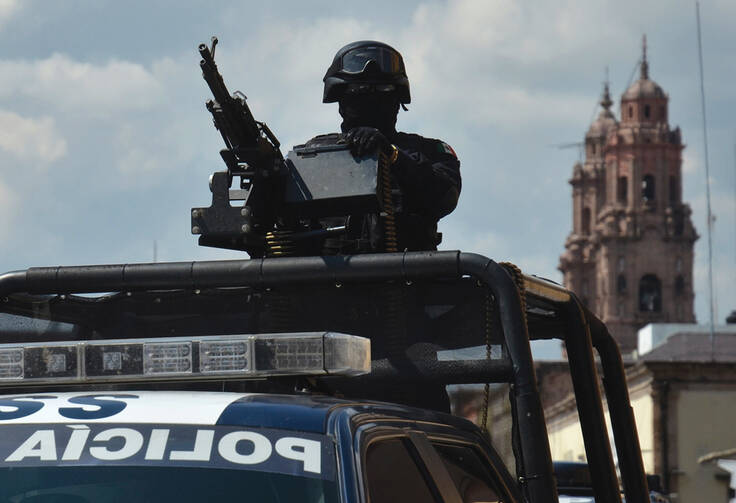‘It’s almost as if we’re in a sort of civil war,” the Rev. Andres Larios, pastor at St. James the Apostle Parish said, somberly assessing the increasing lawlessness which afflicts his community. Some in his village of Coalcomán in Mexico’s western Michoacán State have formed self-defense groups to protect themselves from extortion attempts and attacks by organized criminal groups. Others from the region, known as Tierra Caliente, fled to the United States, he said.
Many more, however, feel trapped, including Father Larios, who has not left Coalcomán in months. Violence once again flared in Michoacán as criminal groups attacked 18 substations and installations operated by the Federal Electricity Commission on Oct. 27, leaving more than 400,000 customers in the dark. The violence plunged the state deeper into crisis as multiple drug cartels—most notorious among them a group known as the Knights Templar—battle for control of criminal proceeds in a state that more and more appears to be ungovernable. Their alleged crimes range from making methamphetamines to extorting avocado growers to taxing each ton of iron ore mined in the state and shipped overseas.
The situation has created concern for Catholic officials, who have called on the state and federal governments to take action and promised to continue tending to the needs of those affected by crime. In an open letter in mid-October, Bishop Miguel Patino Velázquez of Apatzingán, called Michoacán “a failed state” and said “criminal groups contest it...as if it were a jackpot.”
“In [our] communities we hear real dramas daily from persons and families who live in fear and desperation,” wrote Archbishop Alberto Suárez Inda of Morelia, capital of Michoacán, in an open letter on Oct. 27 to the state’s governor, Fausto Vallejo Figueroa.
“We commit ourselves to continue collaborating in [providing] pastoral attention to victims of violence and in the reconstruction of the social fabric, favoring a culture of respect for the rule of law and peace,” the Mexican bishops’ conference said in a statement on Oct. 27 signed by the conference president, Cardinal Francisco Robles Ortega of Guadalajara, and its vice president, Auxiliary Bishop Eugenio Lira Rugarcia of Puebla.
President Felipe Calderón initiated his campaign against Mexico’s drug cartels by sending soldiers into Michoacán in December 2006. That controversial crackdown has claimed more than 70,000 lives. Calderón left office last December, but the new administration of President Enrique Peña Nieto also has had to focus on security in Michoacán.
Bishop Patino painted a bleak picture in his open letter. “Forced abductions, kidnaps, killings, extortions...have increased, and entire families have had to emigrate,” he wrote. “Municipal governments and the police are subordinate and in collusion with criminals, and the rumor increasingly grows that the state government is at the service of organized crime,” the bishop said.
Self-defense groups have subsequently surged, leading to government allegations that organized criminal groups are behind them.
Father Larios disagreed. “Where there are self-defense groups,” he said, “crime has stopped.”








